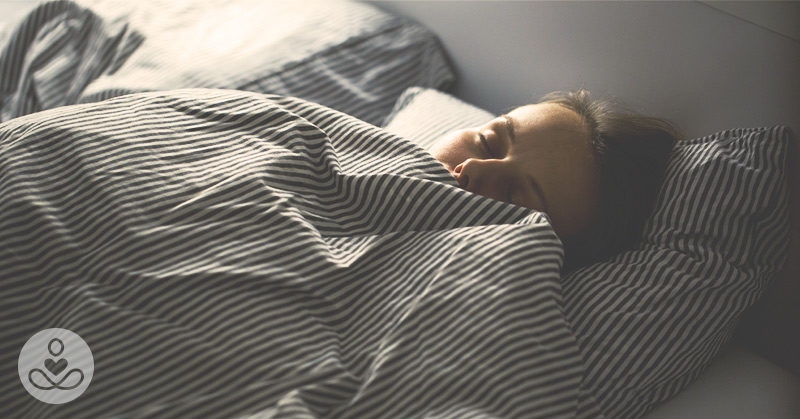If you are someone who struggles with sleep, has struggle with sleep, and continues to struggle with sleep… nothing – I repeat, nothing – fills you with envy more than listening to someone talk about the unbelievably soothing slumber they had the night before.
The reason sleep loss is about so much more than bags under the eyes and feeling a little bit sluggish to you and countless others is because the side effects are far more serious. Suffering from insomnia can potentially skyrocket your risk of anxiety, depression, diabetes, obesity, heart disease, Alzheimer’s, and even cancer. [1]
Insomniacs might be happy to know that there’s one alternative insomnia remedy that has been growing increasingly popular. It’s not like the other insomnia cures that people have tried – it’s cannabis. Yes, it’s natural and seems pretty safe, but there are still a lot of questions surrounding the supposed sleep-inducing herb.
But First, Meet Leigh Weingus

Leigh struggles with sleep, a problem which she has tried to remedy with a combination of physical activity, meditation, natural supplements like melatonin and magnesium, as well as prescription medication. While the drug-free tips have helped, Leigh admits the anti-anxiety medication, Klonopin, “helped [her] fall asleep” but “[she] spent the entire next day feeling like a slightly nauseous zombie.” [2]
As you can imagine, when she heard all the praise CBD (cannabidiol) has been getting, she was open to giving this newer natural alternative a try. (Bonus: Using CBD, she could reap the relaxing benefits of cannabis without the psychoactive – high – effect that you get from THC.) With a wide range of edibles (e.g., gummies or chocolates), capsules and oils, Leigh decided to take CBD in the latter form.
“After a week of taking CBD… every night, it was clear I’d stumbled across something kind of remarkable,” said Leigh. [2] “I often slept well the first few nights of trying something new before it stopped working its magic, which I partially attribute to the placebo effect. With CBD, however, the good nights of sleep kept on coming.”
Every night, about a half-hour before bed, she would take 0.5 ml under her tongue, which was her specific product’s recommended dosage.
“My racing thoughts seemed to come to a screeching halt within an hour of taking it, and when I got into bed I feel asleep as soon as my head hit the pillow. Even better, I woke up feeling refreshed and ready to take on the day.” [2]
How CBD Is Helping People Around the World Sleep Better
In an era where 50 to 70 million American adults live with sleep disorder symptoms, [3] it’s no wonder medical cannabis, the controversial cure, has saturated the mainstream media. According to Dr. Matt Roman, a medical marijuana physician, “Marijuana is an effective sleep aid because it restores a person’s natural sleep cycle, which so often falls out of sync with our schedules in today’s modern lifestyle.” [4]
In an animal study published in the Journal of Psychopharmacology, researchers administered CBD to rats to see how it would affect their sleep patterns. Compared to rats that received a placebo, total percentage of sleep significantly increased in ones that were injected with CBD. [5] Cool, but what about in humans?
A study in the Journal of Clinical Pharmacology also found that insomniacs who received a cannabidiol reported having slept significantly more than those who received a placebo. They also claimed to remember less of their dreams, but whether this suggests they experienced deeper sleeps with shorter REM cycles is unclear. [6]
Researchers have also been studying the effects of CBD on stress and anxiety and, although the studies haven’t been huge, they seem promising nonetheless.
For example, a May 2011 study in Neuropsychopharmacology asked a few dozen people to speak in front of a large crowd. Some received a placebo while others received CBD before each giving their talk. As you probably expect by now, those who took CBD reported feeling less anxious. [7]
Of course, public speaking is different from sleeping. What it suggests, however, is that CBD can be helpful when individuals are in bed and their minds start racing and the stress starts mounting and the anxiety kicks in…
Is CBD the Miracle Cure for Sleep Problems?

Between the growing number of positive studies and stories like Leigh Weingus’, CBD is definitely a promising sleep supplement. We can’t think of anyone who would want to give up the deep sleeps and energized mornings Leigh has been having!
However, as more scientific research surfaces, we’ll be able to make more of a definitive statement. Some people react negatively experiencing symptoms such as nausea, vomiting, or diarrhea. Remember that every person’s body is different, so be sure to ask your personal healthcare provider before taking CBD oil to make sure it’s the best option for you.

Sources
- [1] Insomnia. (2016, October 15). Retrieved from https://www.mayoclinic.org/diseases-conditions/insomnia/symptoms-causes/syc-20355167
- [2] Weingus, L. (2018, September 13). I Tried Using CBD To Help Me Sleep. Here’s What Happened. Retrieved from https://www.huffingtonpost.com/entry/cbd-sleep-insomnia_us_5b980bd7e4b0511db3e6c4f4
- [3] Sleep Statistics – Research & Treatments | American Sleep Assoc. (n.d.). Retrieved from https://www.sleepassociation.org/about-sleep/sleep-statistics/
- [4] Cannabis as a Sleep Aid: Here’s What You Need to Know. (n.d.). Retrieved from https://www.healthline.com/health/medical-marijuana/cannabis-for-sleeping
- [5] Effects of acute systemic administration of cannabidiol on sleep-wake cycle in rats. (n.d.). Retrieved from https://journals.sagepub.com/doi/abs/10.1177/0269881112474524
- [6] Carlini, E. A., & Cunha, J. M. (n.d.). Hypnotic and antiepileptic effects of cannabidiol. Retrieved from https://www.ncbi.nlm.nih.gov/pubmed/7028792?dopt=Abstract
- [7] Bergamaschi, M. M., Queiroz, R. H., Chagas, M. H., Oliveira, D. C., Martinis, B. S., Kapczinski, F., . . . Crippa, J. A. (2011, May). Cannabidiol Reduces the Anxiety Induced by Simulated Public Speaking in Treatment-Naïve Social Phobia Patients. Retrieved from https://www.ncbi.nlm.nih.gov/pmc/articles/PMC3079847/

